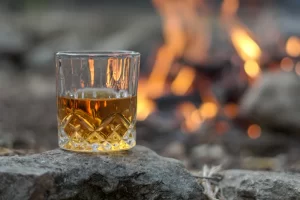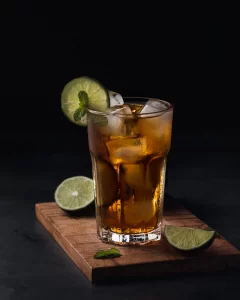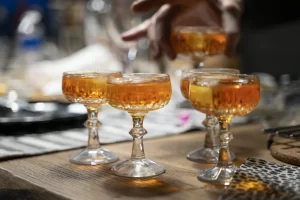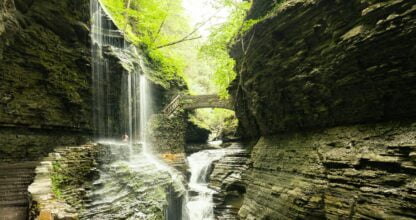Explore the Long, Rich History of Tennessee Distilling
Tennessee distilling has a long, rich history that extends back to the settlement of America. While it has faced trials and tribulations over the years, the whiskey industry has become an internationally recognized force. Today, Tennessee has over 3 million barrels of whiskey in inventory. This stored whiskey is valued at over $5 billion. Explore the rich history of Tennessee Whiskey and some of the best distilleries making this special spirit.
Origins of Tennessee Distilling
People of Scotch-Irish origin began emigrating to the Tennessee and Virginia area in the 18th century. They brought their knowledge of using grains in a fermentation and distillation process. Scotch is a whiskey that is only made in Scotland. Because Scotch is distilled from barley, it was not a far-off jump to use American grains in Tennessee distilling.
The middle and eastern area of what we call Tennessee today is ideally suited for distilling whiskey. The rich soil is ideal for growing corn. There is an abundance of forest wood and white oak for barrel making. The river system networks throughout the entire region, making transporting the finished whiskey to new markets simple. Distillers could get their products to Nashville, Memphis, Chattanooga, and Knoxville.
Whiskey quickly became the drink of choice among gentlemen. President Andrew Jackson chose whiskey to serve at the White House during his presidency. James Polk continued this tradition during his presidency. Whiskey became so popular that soldiers during the Revolutionary War were paid in whiskey.
It was during this time that the maple charcoal filtering method was developed. Alfred Eaton was credited with the practice as early as 1825. Hundreds of small farm-based distillers across the region developed their methods and techniques. Over 700 distilleries populated the region by the 19th century.
Lincoln County Process
Tennessee Whiskey is not like whiskey made anywhere else in the world. First, it must be distilled in Tennessee. Second, the distillation process must include the Lincoln County Process. Almost all Tennessee whiskeys go through this required additional filtering process. Before aging, the freshly distilled whiskey gets filtered through a thick layer of maple charcoal. The steeped whiskey then gets put into freshly charred oak barrels for aging. The extra filtering step adds and improves the whiskey’s flavor.
While this process began as an anecdotal practice, it eventually became law. Tennessee Governor Bill Haslam signed House Bill 1084 in 2013. It legally requires the Lincoln County Process to be used in the distilling process for the spirit’s bottle to be labeled Tennessee Whiskey. Jack Daniels strongly advocated for the law, while smaller distilleries argued against it. It was stated that Jack Daniels wanted to cut out the competition by making market entry harder, as Jack Daniels already used the Lincoln County Process in its distilling practices. The law does make one exception for Benjamin Prichard’s distillery. It is the only one that is not required to use the process.
Prohibition
The country’s prohibition era was the death of Tennessee distilling. All legal commercial distilling activities were ceased. Any distilling that took place was done in secret and called moonshine. Unfortunately, most whiskey distilleries in operation pre-prohibition did not resume operations post-prohibition.
The first temperance societies began activity and took up residence in Tennessee in 1829. In 1910, these groups successfully convinced Tennessee to be the first state to pass prohibition laws preventing the manufacturing and sale of alcohol.
Post Prohibition
Tennessee was slow to follow suit when the federal Prohibition ended. It wasn’t until 1933 that Tennessee’s state prohibition ended. Once this happened, the Jack Daniels distillery moved its operations back to Lynchburg. It was the first distillery to open in the state. The distillery had attempted to continue operations in Missouri and Alabama, but neither location was suitable for producing the same quality spirit as what was achievable in Tennessee. Following Jack Daniels obtaining a license, George Dickel followed suit and revived his distillery in 1958.
Despite the ending of Prohibition, Tennessee distilling has been slow to gain acceptance. Many counties remain dry to this day. Ironically, the country that Jack Daniels calls home is a dry county. The distillery’s samples given out on tours are for “educational purposes” to get around the county’s dry laws. Many other counties allow alcohol, but only beer and wine.
It wasn’t until 2009 that the state legislature amended the statutes to expand the allowance of distilling. It broadened from three counties to 41. Later, the legislation was expanded again to include 75 of the state’s 95 counties.
Pop Culture Presence
Tennessee Whiskey has become so well-known that it has entered pop culture. David Allen Coe sang a song named after it on his 1981 album. Then George Jones covered it in 1981. Chris Stapleton then recorded his version in 2015.
Legal Qualifications and Protections
Tennessee Whiskey is more than just a moniker or marketing term. The spirit has legally established protections. Under the North American Free Trade Agreement (NAFTA), it must be distilled in Tennessee and meet specific standards. It is protected under at least one international trade agreement and Canada’s Food and Drug Law. This is similar to the restriction that only agave spirits from specific regions of Mexico can be called tequila. Or how only sparkling white wine from the Champagne region of France can be called champagne.
Tennessee Distillers Guild
In 2014, 13 individuals came together to form the Tennessee Distillers Guild. The purpose was to advocate for the best interest of the distilleries while also providing educational opportunities. Today, 31 distilleries are members of the guild from across the state.
Tennessee Whiskey Trail
Started in 2017, the Tennessee Whiskey Trail was established by the Tennessee Distillers Guild. It currently has 29 distilleries on the trail. They are organized by location, with distilleries from the West, Middle, and East regions. The trail has become a valuable promotional tool, encouraging tourists from all over to visit.
Tennessee Whiskey Distillers
A handful of distilleries make Tennessee Whiskey high quality enough to be known worldwide. Most of these distilleries are new, as very few managed to exist after Prohibition.
Jack Daniels
The most famous of Tennessee distilleries is Jack Daniels. It is the oldest distillery in the United States, celebrating its 150th anniversary in 2016. This is assuming you date it back to when the brand was registered with the federal government in 1866. Jaster “Jack” Newton Daniel started the distillery in 1866. However, it wasn’t established as a brand until 1875. There were also a few questionable years of operation during Prohibition.
George Dickel Distillery
Another one of the oldest distilleries in Tennessee is the George Dickel Distillery. It originally began as the Cascade Hollow Distillery, which opened in 1878. Local businessman George Dickel bought a large share of the operation, and it eventually took on his namesake. The distillation process is what distinguishes the whiskey from its competitors. George always believed that winter produced better quality whiskey. So, following this belief, all liquids are chilled to 40 degrees before filtering through charcoal. It is claimed that this produces a smoother yet still impressively complex flavor profile.
Benjamin Prichard’s
Ironically, Benjamin Prichard’s Distillery is the only distillery operating in Lincoln County. Yet, it is the only distillery with an official legal pardon not to use the Lincoln County Process in its Tennessee Whiskey making. The distilling process at Prichard’s stays true to the traditional methods. Only pot stills are used, rather than the column still counterparts. This limits production volumes but ensures the finished whiskey stays true to the original spirit.
The distillery operation in operation today was founded by its master distiller, Phil Prichard. He is the descendant of the original Prichard distillery founder, Benjamin Prichard. Phil follows the same techniques and processes that his ancestor Benjamin used in the 1700s.
Nelson’s Green Brier Distillery
Charles Nelson was a prominent local businessman in Greenbrier, TN, when he decided to enter the Tennessee distilling industry. He was successful, eventually growing the distillery to produce 380,000 gallons in 1885. This was about two million bottles, significantly more than other distilleries at the time. Unfortunately, Prohibition shut down the distillery. It wasn’t until 2009 that the family descendants began the distillery operations again.
Chattanooga Whiskey Company
Opening in 2015, the Chattanooga Whiskey Company was the first distillery in Chattanooga in over a century. Now is the perfect time to sign up for a tour and tasting, with over 100 whiskey barrels aging in the cellar. The lineup of spirits includes Tennessee high malt, single barrels, and experimental batches. The experimental craft spirits are arguably the most exciting product to come out of its Tennessee distilling efforts. You’ll find unique offerings such as pecan-infused, bourbon barrel limoncello, honey-infused, smoked, maple syrup barrel-finished, coffee-infused, tequila barrel-finished, and fig-infused.
Uncle Nearest Premium Whiskey
Jack Daniel, the founder of the famous distillery, learned everything he knew from a formerly enslaved man named Nathan “Nearest” Green. For years, the man beyond the beloved whiskey’s origin went unknown. That is until the Uncle Nearest Premium Whiskey was founded. Now, his memory is brought to life in modern times, allowing whiskey enthusiasts to celebrate his careful whiskey distilling methods. Nathan “Nearest” Green is the first known African-American master distiller.
Distillers Not Making Tennessee Whiskey
Not all distilleries in Tennessee make Tennessee Whiskey. Some distilleries make whiskey but do not follow all of the requirements to have it qualify as Tennessee Whiskey. Even some of the previously mentioned distillers make several whiskey varieties. This makes paying attention to what you are tasting and buying important. You don’t want to accidentally buy whiskey and mistake it for Tennessee Whiskey.
For example, George Dickel Distillery makes its classic Tennessee Whiskey Signature blend. However, it also makes bourbon whiskey and rye whiskey. Jack Daniels Distillery makes its classic No. 7 whiskey. It also uses this as the base for its Tennessee honey, fire, and apple. It also has a Gentleman Jack that goes through an additional charcoal filtering. Or there are the triple mash and rye varieties.
Ole Smoky Distillery
The Ole Smoky Distillery was established in 2010 and is located in Tennessee. The distillery has several whiskeys in its spirit lineup. However, none of them are Tennessee Whiskey, as the distillery does not use the Lincoln County Process. Because of this, the distillery describes its spirits as “Tennessee moonshine” instead. Doing so prevents consumer confusion and keeps the distillery out of trouble with Tennessee laws.
Short Mountain Distillery
The Short Mountain Distillery is the sixth registered distillery in Tennessee. It began whiskey production in 2012. The 300-acre farm the distillery calls home was once the location of a moonshine operation for Al Capone. Today, the distillery uses locally grown corn and water from a spring on the property to make Tennessee Whiskey. The distillery also produces bourbon whiskey, rye whiskey, and moonshine.
FAQs About Tennessee Distilling
What is the oldest distillery in Tennessee?
The oldest distillery in Tennessee is the Jack Daniel Distillery. The founder, Jack Daniel, registered the distillery in 1866 in Lynchburg, TN. It celebrated its 150 anniversary in 2016 and continues to be a hotspot tourist attraction for Jack Daniel’s fans across the country and beyond.
Why is Tennessee whiskey, not bourbon?
Tennessee whiskey must undergo an additional filtration process that bourbon does not. It is called the Lincoln County Process. This creates a more mellow spirit than traditional bourbon. There are a few similarities between the two, however. For example, both are aged carefully in new charred oak barrels, minimum 80 proof, and made with at least 51% corn mash.
Can you drink 100-year-old whiskey?
Yes, you can drink 100-year-old whiskey. It won’t expire and spoil. However, liquor loses its flavor and alcohol content over time. So, drinking 100-year-old whiskey will likely be an underwhelming experience.
Is it legal to distill alcohol in Tennessee?
Tennessee distilling is not illegal. However, if you want to operate a distillery, you need to have a license. You will need to apply for and obtain a license before you start distilling.
Taste Tennessee whiskey for yourself by taking a distillery tour at one of the best distilleries in Tennessee listed on Distillery Nearby. Let our distillery tour locator help you plot your course across the state, sipping and sampling Tennessee’s finest whiskey and bourbon varieties.









